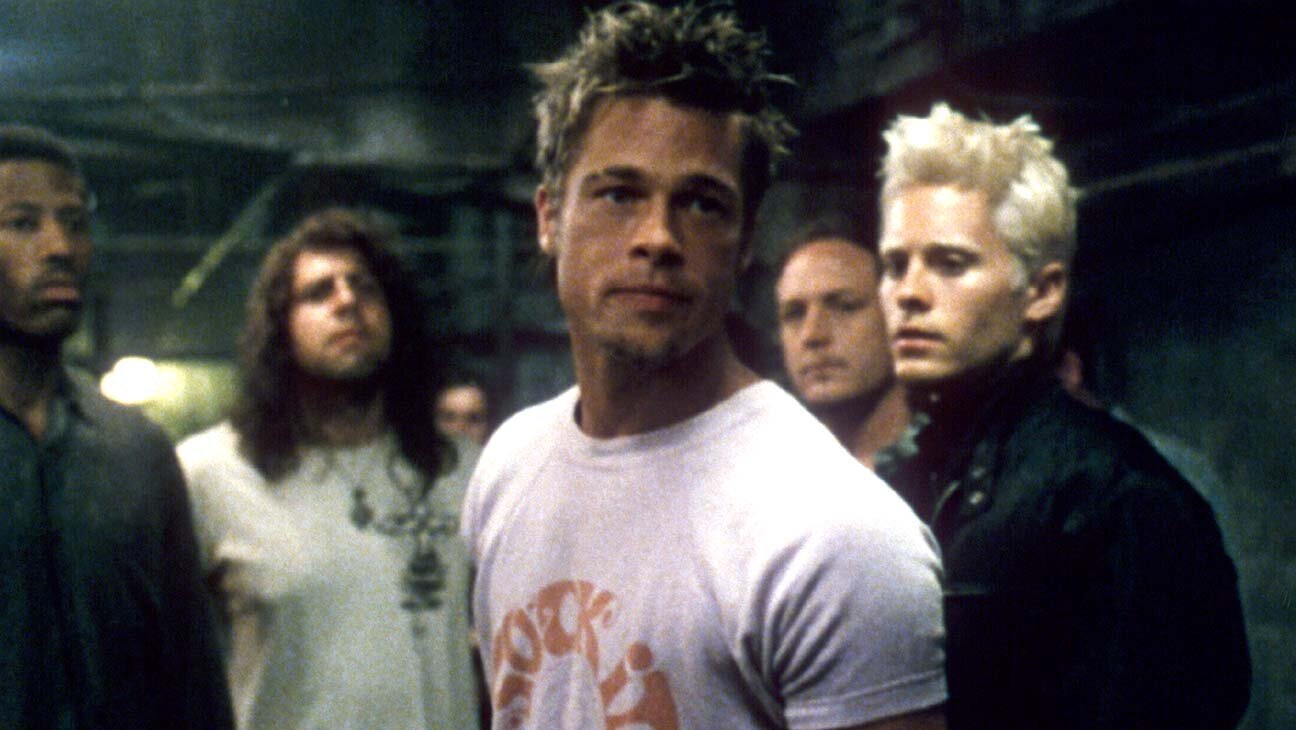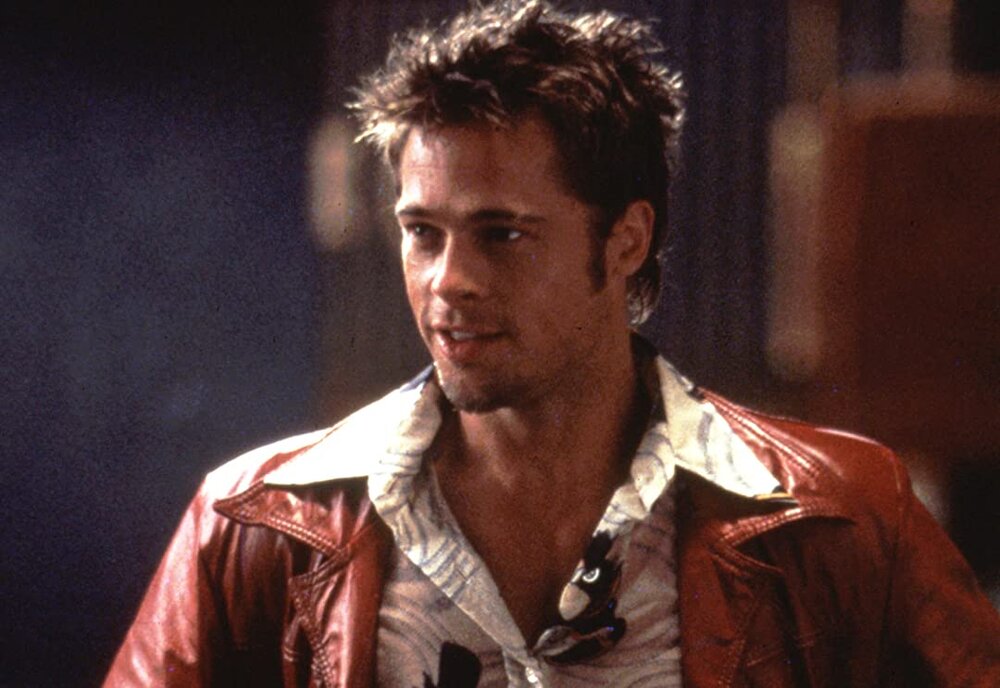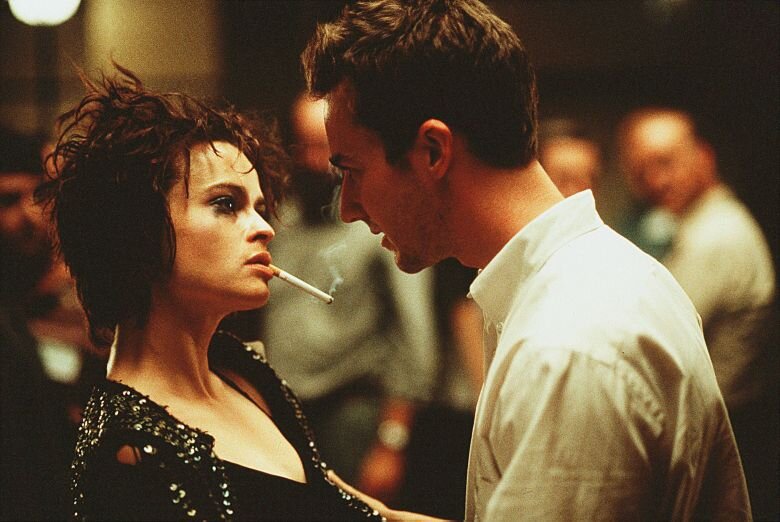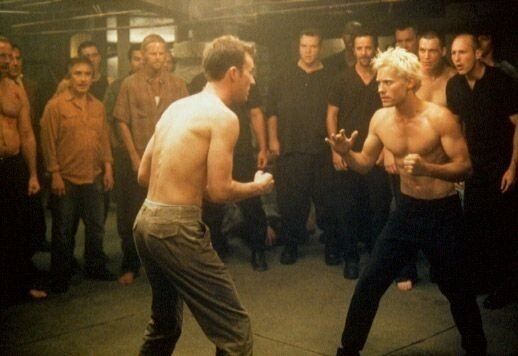|
The first rule of Fight Club is… you don’t talk about Fight Club…. Well. I’m about to TALK ABOUT FIGHT CLUB. The first time I encountered Tyler Durden was in high school. Me, a rag-a-muffin garbage person interested in counter-culture and things that are kinda flashy and gross. Enter Chuck Phalaniuk’s book Invisible Monsters. From Brandy Alexander, I found Fight Club. I ripped through the book and walked to the local Blockbuster to purchase a used VHS of David Fincher’s Fight Club. I was hooked. Masculine and highly stylized, but hyper focused, Fight Club quickly became the movie on a constant loop in my bedroom television’s VHS player. I’d fall asleep somewhere around Project Mayhem most nights, but I still have most of the front half of the film memorized. Marla Singer was the ideal and Tyler Durden was the coolest of the cool. Also, did you know the fictional world of Fight Club is supposedly set in Wilmington? One drive through Wilmington’s city center, with all its credit card companies looming about a poor city, you see the likeness. Apparently, Fincher wanted to film in Wilmington, but the city said no because the same credit card companies Fight Club blows up are the ones paying the city’s bills. My love for this movie is…. Impressive. It’s endlessly quotable. The performances are next level. The world is fully realized, and David Fincher is at the top of his game. You can smell the churches, the meeting rooms, the cigarette smoke clinging to Marla’s jacket. Speaking of jackets…. I could write an entire dissertation on Brad Pitt’s leather jacket. I love it so much. Pitt’s contribution this film, besides displaying a six pack of abs that could cut glass, is also a lesson in how far charisma can push a performance into the “iconic” category. Edward Norton has the thankless task of being the audience surrogate, and he carries that burden well, but Brad Pitt is allowed to let loose and have fun. His recent Oscar winning turn as Cliff Booth in Once Upon a Time…. In Hollywood borrows some swagger from Fight Club, but without as much of the edge. Then there is Helena Bonham Carter. Marla is the best character. Perhaps the hardest bitch of them all, she stays steady and consistent in a world filled with little boys punching each other in the face. Let me speak on those boys. I hate that this film gets a “boy’s club” reputation…because why wouldn’t it….it is LITERALLY about a boy’s club and the destruction that comes from that exclusivity. Chuck Palahniuk, as a gay man, wrote a book that shows how dumb it is to keep everything inside. He wrote about how terrible it is to not be able to live your truth and have to retreat underground. Capitalism destroyed the narrator at the heart of Fight Club, and so Tyler appears in his life to destroy capitalism and make “toxic masculinity” a brand he can capitalize on. Without support, a society can turn to violence. Our narrator seeks comfort in support groups. Fight Club becomes a support group without diverse inputs or individuality. Fight Club becomes a destructive unit, and what starts as consenting violence turns into something worse. A rebellion of assholes. The turning point is when Tyler gives the club homework: “Pick a fight with somebody in the real world. But you have to lose.” None of the normie folk consent to this treatment. It’s assholes versus regular people. Tyler says it early on. “Sticking feathers up your butt does not make you a chicken.” Punching a stranger in the face or blowing up a credit card company does not make you a hero. Tyler takes advantage of the angry men (mostly white, yes) he appeals to, making the movie more and more disturbing and more and more desperate as it goes along. The film doesn’t glorify this. It’s creepy and fucked up. “It’s only after we’ve lost everything that we’re free to do anything” is tempting, but it isn’t substantial. It’s self-indulgent, it’s selfish, and it’s soul sucking. It’s a way for the men at the heart of Fight Club to shake off responsibility and be terrorist fuck faces. The movie doesn’t make this a pretty sight. They’re psychopaths and Marla, the only person in the movie who criticizes this behavior, is the only person our narrator can trust and connect with in the end. Connection and affection (alone with the combination of a bullet to the skull) sets him free of Tyler. The movie doesn’t end with a clean “the end”, instead we watch the world burn as Marla and the Narrator watch. Scared, but ready to rebuild. Together.
Palahniuk has gone on record to say the movie is better than his book. The book is excellent. The ending of this film is iconic. If you wake up at a different time, in a different place, could you wake up as a different person? Well, yeah, I guess. But it doesn’t mean that different person is a nice person. I love films without easy answers. Fight Club is funny and fucked up. That place between a giggle and a panic attack I search for in all of the work I, as an actor and an artist, attempt to create. I love it. Re-post from Cinema76.com
1 Comment
|
Collected articles, Thoughts, and Film reviewsRe-posted from original publications. Archives
June 2021
Categories |




 RSS Feed
RSS Feed